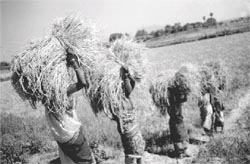Fighting it out
 for a majority of Orissa's 22.21 per cent of population that is tribal and traditionally depends on the forest, the collection of minor forest produce ( mfp ) is a vital economic activity. The main occupation for 15 per cent of the tribal people in Orissa, it is a subsidiary activity for an estimated 34 per cent of the tribal population. Of the 1.4 million tribal households in the state, a million live in and around forests.
for a majority of Orissa's 22.21 per cent of population that is tribal and traditionally depends on the forest, the collection of minor forest produce ( mfp ) is a vital economic activity. The main occupation for 15 per cent of the tribal people in Orissa, it is a subsidiary activity for an estimated 34 per cent of the tribal population. Of the 1.4 million tribal households in the state, a million live in and around forests.
Collection of mfp is primarily the occupation of women, and they are the ones who bear the burden of increasing deforestation. According to a study by the Bhubaneshwar-based non-governmental organisation ( ngo ) Vasundhara, mfp collection is undertaken by the poorest sections of the villages as it is labour intensive and the returns are quite low.
Apart from kendu , sal seeds and bamboo, the three nationalised products, trading rights to almost all marketable mfp s are given away as monopoly leases, according to the ngo Vasundhara. Monopoly collection rights for produce such as cashew nuts, bamboo and fibrous grasses are often auctioned to private contractors or leased to agencies such as large-scale adivasi multipurpose cooperative societies ( lamps ) in tribal areas.
But, in Orissa, one single private company has been given the collection rights for 29 items of mfp for 10 years, with no check on the prices it pays to the tribal people who engage in collection. Predictably, the profits from value addition through processing of mfp s goes to the contractors, traders, industry, lamps or state agencies, not to the tribal people. For years, women have been waging a stiff battle to secure that elusive mfp lease.
For its part, the state government has set up the Tribal Development Cooperative Cooperation ( tdcc ) to procure the surplus agricultural produce and mfp from tribal people at a remunerative price and arrange for their marketing. The tdcc has been running losses since its inception. Thus, it has surrendered six mfp items and leased the collection of many products to private parties that exploit the tribal people.
Women's initiative In Halyasahi, a bonded labourers' hamlet near Mandibisi village, women have been fighting for long to secure a lease for hill brooms. Trained by Agragamee, a Kashipur-based ngo , they formed the Mandibisi Mahila Mandal in 1992, says Sukri Majhi, a member of the mandal. By depositing their stipends into a common fund from 1990 onwards, about 40 women formed the mandal with a core fund of Rs 14,850 to work for the socioeconomic development of tribal women.
The members of the mandal even raised the issue of monopoly rights with the then chief minister Biju Patnaik's office. During a meeting with the mandal members, he promised them a lease, says Majhi. Registered in August 1994, the mandal applied for a licence to collect and market hill brooms. Their application was rejected as the tdcc was the sole leaseholder. Fed up with the bureaucracy, the mandal went ahead and bought hill broom stocks with the sum of Rs 74,500 that they had raised.
In May 1995, the forest department and the tdcc swooped down on the mandal's training programme to bind the brooms, taking away 174 quintals of hill broom stocks from the women despite strong protests, and lodged a case of unauthorised collection against them. Barely half the material was returned following a case filed in the high court.
The same year, the tdcc prohibited the direct sale of broomsticks and also seized huge quantities of broomsticks in the districts of Phulbani, Koraput, Nowrangpur, Rayagada and Kalahandi, collected after permission from the collector of Kalahandi in 1994 to prepare and sell directly. The women then formed a block-level organisation, the Ama Sangathana (Our Organisation), in Kashipur to bid for the lease, which they managed to get in 1996-97. Apart from having to pay a high royalty of Rs 70,000 for forest rents, the women have to work without any credit or marketing facilities.
Despite the odds, it has been a gradual journey to self sufficiency for the 555 members of the organisation from the Kashipur block. They have now learnt to maintain bank accounts and have also gathered the confidence to apprise the forest secretary of their problems.
Women's Feature Service .
Related Content
- Recipe for a livable planet: achieving net zero emissions in the agrifood system
- Order of the National Green Tribunal regarding solid waste dumping site, Darjeeling municipality, West Bengal, 18/03/2024
- Pricing forest carbon
- Does global warming worsen poverty and inequality? an updated review
- Comparative study of carbon rights in the context of jurisdictional REDD+: case studies from Africa, Asia and the Pacific, and Latin America and the Caribbean
- World economic situation and prospects 2024
